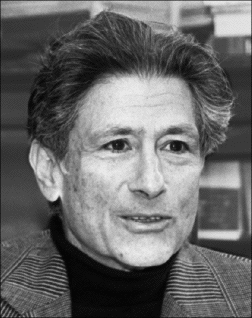|
|
|
|
His recent accomplishments highlight the broad scope of his scholarly and professional interests over four decades. Last month, he traveled to Dubai in the United Arab Emirates to receive the Sultan Owais Prize in honor of his life’s work. Named for a wealthy Arab businessman, the Owais Prize is the premier literary prize of the Arab world. Said was born in Jerusalem in 1935 and was for many years America’s foremost spokesman for the Palestinian cause. His writings have been translated into 26 languages, including his most influential book, Orientalism (1978), an examination of the way the West perceives the Islamic world. Much of his writing beyond literary and cultural criticism is inspired by his passionate advocacy of the Palestinian cause, including The Question of Palestine, (1979), Covering Islam (1981), After the Last Sky (1986) and Blaming the Victims (1988). He is the only American citizen to receive the Owais Prize. Said is vice president of the prestigious Modern Language Association, the professional association of literary scholars, and next January he will become president. In recent years the M.L.A. has been beset by warring camps in the debate over political correctness, multiculturalism and diversity on college campuses. Now Said believes the association is evolving toward a more universal outlook. “I think we are past this more cantankerous period,” he said. “It is now a more richly tolerant organization.” As the world press turns its attention this spring to observances of Israel’s 50th anniversary, the British Broadcasting Corporation chose Said to document the Jewish state’s history from the point of view of a Palestinian, a perspective certain to be intensely provocative in some quarters. It is Said’s first film project and he serves both as writer and interviewer. Filmed in Israel, Arab nations and Britain, the documentary will be broadcast later this spring. Said was a prominent member of the Palestinian parliament-in-exile for 14 years until he quietly stepped down in 1991. He had broken with Yasir Arafat after decades of support, saying the P.L.O. lacked credibility and moral authority. He has called the peace agreement between Israel and the P.L.O. “an instrument of Palestinian surrender” and an extension of Israel’s long-standing policy to dominate the Arabs militarily and economically. His criticism extends to the United States, which he calls a “dishonest broker” in the peace process due to its long-standing support for Israel. Next year, Knopf will publish Said’s memoirs of his childhood through his graduate student days. The book, titled Not Quite Right, chronicles his early years in Jerusalem as the son of a wealthy Palestinian Christian businessman, his family’s exile to Cairo after the founding of Israel, his education at a New England boarding school, undergraduate years at Princeton and graduate study at Harvard. Also due to be published next year are a collection of literary essays and a book on opera. Interviewed in his spacious, book-lined office in Philosophy Hall, his academic home for the last 35 years, Said spoke openly about his treatment for chronic leukemia, for which he has received periodic chemotherapy treatments since the disease was first diagnosed in 1992. His prognosis continues to be good. He said he has learned to accommodate his life to the treatments, and to pace his activity against the burden of periodic exhaustion. Last year, he gave the inaugural set of William Empson Lectures at Cambridge, the Rajiv Gandhi Memorial Lecture in Delhi and the Netaji Centenary Oration at the Netaji Institute in Calcutta. This year, he was a distinguished lecturer at The Collège de France. In Delhi, he received honorary doctorates at Jawaharlal Nehru University and Jamiya Milleya Islamiya. While Said, who is fluent in Arabic and French, remains a sought-after commentator in this country on Middle Eastern politics, and is often heard on National Public Radio, his views are as likely these days to be broadcast and published abroad. He is a frequent commentator for the BBC, Canadian Broadcasting and on Australian radio. He writes about the Middle East and other subjects for The Progressive and contributes a twice-monthly column to Al Hayat, the London-based Arabic daily that circulates throughout the Arab world. Said, an accomplished pianist and scholar of music, is the music critic of The Nation. Although he occasionally writes opinion pieces for leading American newspapers, he finds overseas publications and radio much more receptive to his critical view of events in the Middle East. He eschews the “sound bite” mentality of the American television networks, in favor of the longer pieces produced by NPR and similar radio networks abroad. He views major U.S. publications as “ideologically hostile” to his viewpoint. “I’ve lost my taste for this type of forum,” he said. |
 Arrogance in US foreign policy A desolation, and they called it peace Resources at MSANEWS ScholarsBase Faculty Frofile (Columbia University) A Palestinian Literary Critic Confronts Time Rice University Lecture Series 1997-98 US Conflict of Powers in the M.E. Outstanding Americans: Ed Said (22/9/1998)~~~ Conversations with the original personalities |